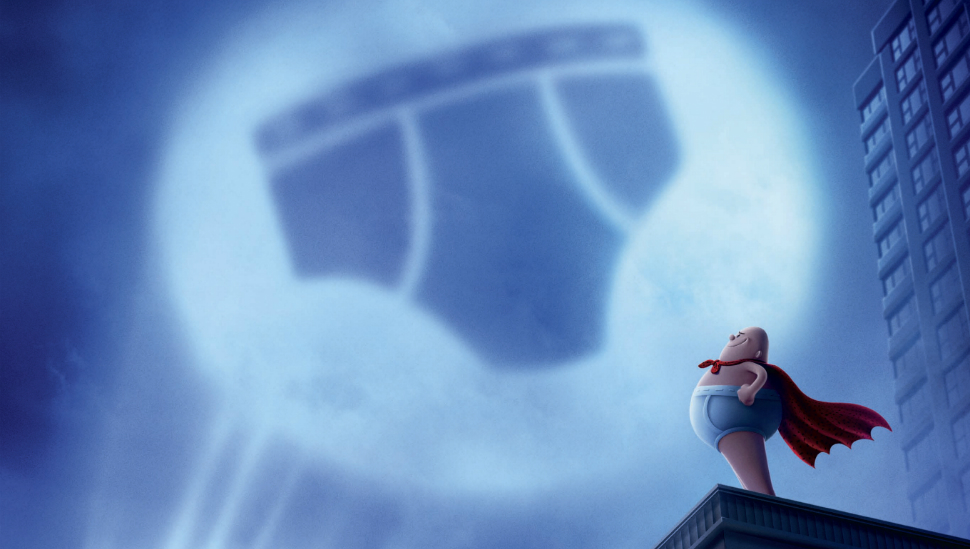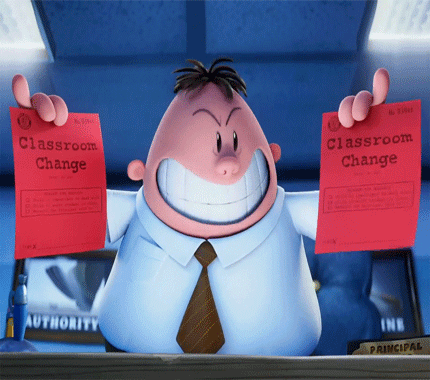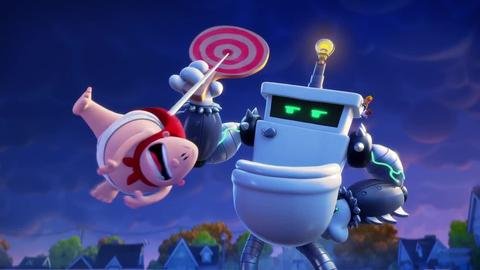It is said that the perfect is often the enemy of the good.
Unfortunately, the good can also be the enemy of the best.
The movie I'm reviewing today perhaps wisely chose to keep itself from pursuing transcendence, but in doing so missed an opportunity that could have been revolutionary.
Now, I know what you're asking yourself: "What movie could possibly have the kind of potential Mr. Horne is talking about? In the entire Netflix library, what film has the sophistication to be so close to the cusp of greatness and almost transformative to society at large."
It should come as no surprise that the answer, naturally, is Captain Underpants: The First Epic Movie.
A High Bar to Cross

Perhaps I'm just spoiled.
In a world where The Lego Movie exists, it is all too easy to demand that animated films---even ones built on the most seemingly shallow of premises---contain a hidden philosophical depth that leaves the audience in awe when the curtain is drawn back and the magic trick is finished.
But I know Captain Underpants could have done it. I even saw traces of an attempt left in the movie, as if an earlier draft of the screenplay had made such an attempt.
Of course, if such a message did not make it into the final movie, then it is possible that the earlier attempt failed, or just would not fit within the framework they had. And yet, as a passive viewer I still got an idea for how it could have been made to work.
Perhaps I'm overanalyzing. But then, I am a movie critic.
The Story
Captain Underpants is not a superhero story.
It has a superhero in it, but that is just a contrivance that serves the main plot, which is about two boys named George and Harold.

They are typical boys. They like comic books, toilet humor, and pulling pranks. Their friendship only amplifies their behavior, and the trouble they stir up keeps growing at an accelerated pace.
Which would be bad enough on its own, but it also happens that they're school is run by the meanest, most humorless principle in the history of the world: Benjamin Krupp.

Mr. Krupp is particularly perturbed by the comics that the boys draw and distribute throughout the school, featuring a nearly naked superhero named "Captain Underpants". And when their latest prank lands them in hot water, the boys find out that he intends to correct the problem by permanently separating them.
Desperate, the boys try one last prank to stop Krupp's plan: hypnotizing him with a cheap ring found in a cereal box. And when the plan works, they can't stop themselves from pushing it too far, convincing their mesmerized principal that he is now Captain Underpants himself.

But their delight is interrupted when the new captain decides it's time to start fighting crime and heads out to save the world.
The two boys rush to stop their creation from causing havoc, trying to cover up his actions everywhere he goes. And in time they convince Captain Underpants to assume a secret identity as their principal, and put him back in Principal Krupp's clothes even though his personality is still that of a larger-than-life superhero.
The now ultra-permissive Principal Krupp quickly lets the school descend into anarchy, even hiring a new science teacher with dubious qualifications. And when school life becomes too chaotic, the boys are forced to reluctantly restore Mr. Krupp's personality, even if it means being put in separate classes.
Which, as it turns out, is the wrong move, because the new science teacher, Professor Poopypants, is preparing to take over the world by destroying everyone's sense of humor. A sadly necessary step for the professor, since no matter how many Nobel prizes you win, no one will take you seriously with a name like "Poopypants".

Only George and Harold can put a stop to his plans. But to do that, they may have to enlist the help of a certain underwear-themed hero.
When Faithfulness Becomes a Negative

One thing that can be said about Captain Underpants: The First Epic Movie is that it prioritizes faithfulness to the book series that spawned it.
The Captain Underpants series of books are extremely self-aware satire comedies. The narrative has no issue jibing the reader about how improbable the story is.
And the movie tries to recapture that spirit by having George and Harold narrate the story, even going so far as to address the audience directly.
And that sadly does not work as well in a movie as it does in the books.
Fourth wall humor is some of the best humor out there. It is also, however, one of the most expensive kinds of humor, in that employing it often takes away from other aspects of the story you are telling. Each time it is done you poke a hole in the audience's engagement with the underlying story.

Having George and Harold be aware of the audience undercut what could have been a powerful story. The fact that this awareness came in the form of narration redoubled the problem, as narration in movies is almost never a good idea (people don't need someone to explain what they can plainly see on screen).
The movie also tries to employ the "Flip-o-Rama" gimmick found in the Captain Underpants books. And, honestly, it just doesn't work here. I understand why they included it, out of a desire for consistency with the source material, but a foolish consistency is, in this case, the hobgoblin of little minds.
So How would You have Done It Differently?

As I said before, The Lego Movie has forever spoiled me when it comes to depth in animated movies. What people thought was going to be a shallow, commercially driven film was actually an uplifting message about inclusiveness, and building a bridge between people who like to draw inside the lines and those who want unfettered creativity.
In the end, The Lego Movie was an illuminating lesson about the importance of play.
Captain Underpants could have done the same thing, but with toilet humor. Inappropriate humor is often castigated in today's hypersensitive society. We've reached a point where we need someone to remind us, in Lego-Movie-esque terms, that it's important to unwind sometimes and just let lowbrow humor be funny, because we all need a break from decorum now and then.
There was a scene, in Captain Underpants, where George and Harold take the unconscious Principal Krupp to his one-bedroom house, where he lives all alone under the light of a single lightbulb and eats his dinner with on a single plate he uses over and over, emphasizing just how lonely the life of an adult can be.
I believe it was a mistake to have Principal Krupp unconscious for this entire scene. If I could go back and change one thing about the movie, I would have him wake up and confront the boys while they are in his house. And, after chewing them out for breaking into his home, he would take the opportunity to teach them a lesson. When they ask why his home is so pathetic, he tells them, "This is what life is like. When your childhood ends, there are no more jokes, no more pranks, and this is where you end up. It's about time you boys saw how the real world works." And he then reveals that the reason he is so strict with the boys is that he wants to prepare them for the disappointment of adult life, so that they can do a little better than he did.
And I would have this event rattle the boys so much that they despondently consent to be put in separate classes. After that, we could keep the climactic final battle where toilet humor saves the day, except I would also retouch those scenes so that toilet humor also redeems some of the adults in George and Harold's life, even to the point where Principal Krupp accepts his identity as Captain Underpants, with all the inappropriateness that comes with it.
It would be a departure from the source material, but it would have strengthened the movie from good to fantastic.
My Judgment
Captain Underpants may not be the movie we deserve, but it might be the movie we need right now.
It is genuinely funny, and well worth a look. Though it misses an opportunity, it does have merit beyond simple humor. The friendship portrayed between George and Harold is one of the most genuine put to the silver screen. As a duo, they are heartwarming. And I certainly hope that DreamWorks continues the series, as there are lots of places they can take the story from here---amazing places that may yet release the full potential of this franchise.
It's on Netflix. What's your excuse?
Previous entries in the Netflixing series:
Past Years
TV Shows
Movies
